2006年浙江地区英语课语法-形容词副词用法资料-新人教[整理][上下学期通用]
文档属性
| 名称 | 2006年浙江地区英语课语法-形容词副词用法资料-新人教[整理][上下学期通用] |
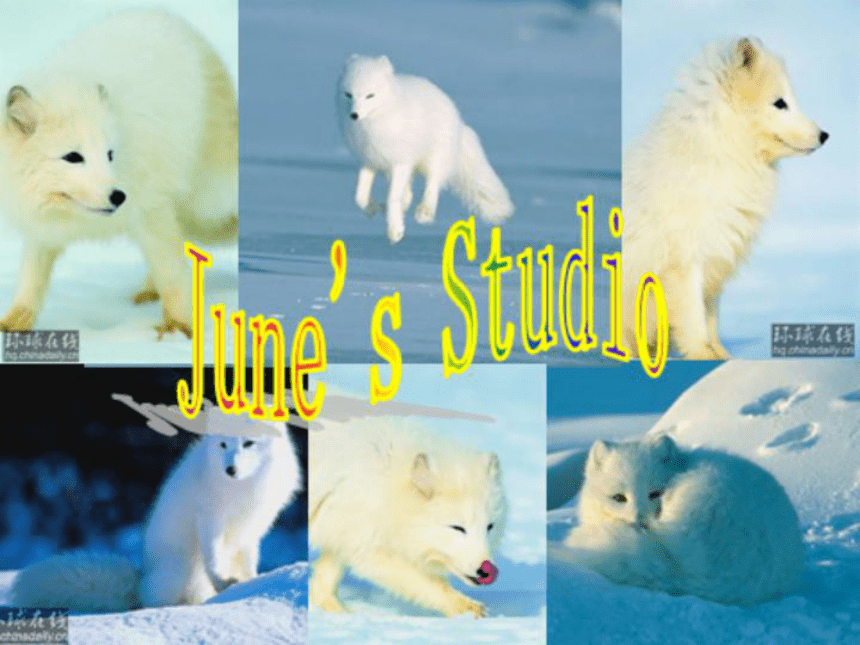
|
|
| 格式 | rar | ||
| 文件大小 | 321.0KB | ||
| 资源类型 | 教案 | ||
| 版本资源 | 通用版 | ||
| 科目 | 英语 | ||
| 更新时间 | 2006-11-04 11:28:00 | ||
图片预览


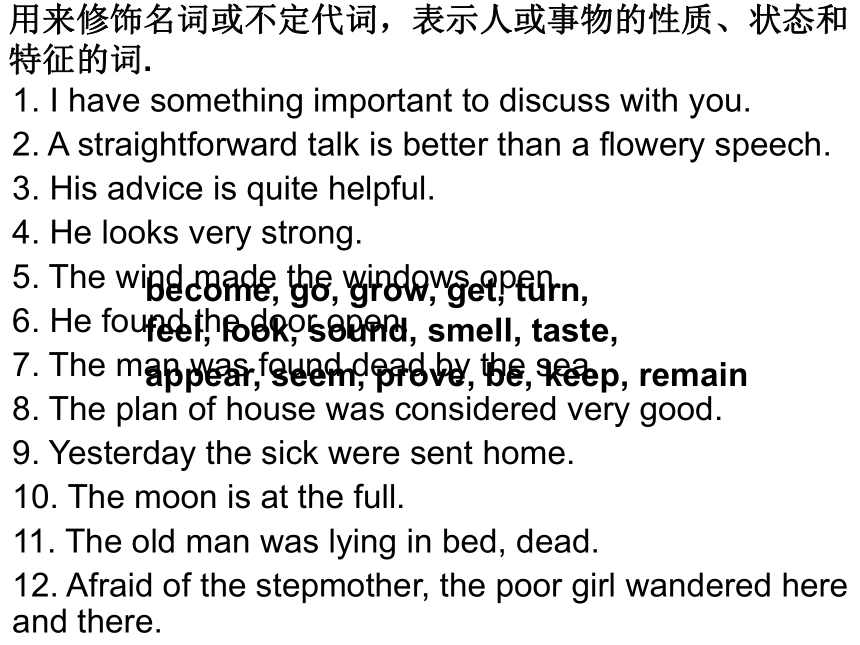
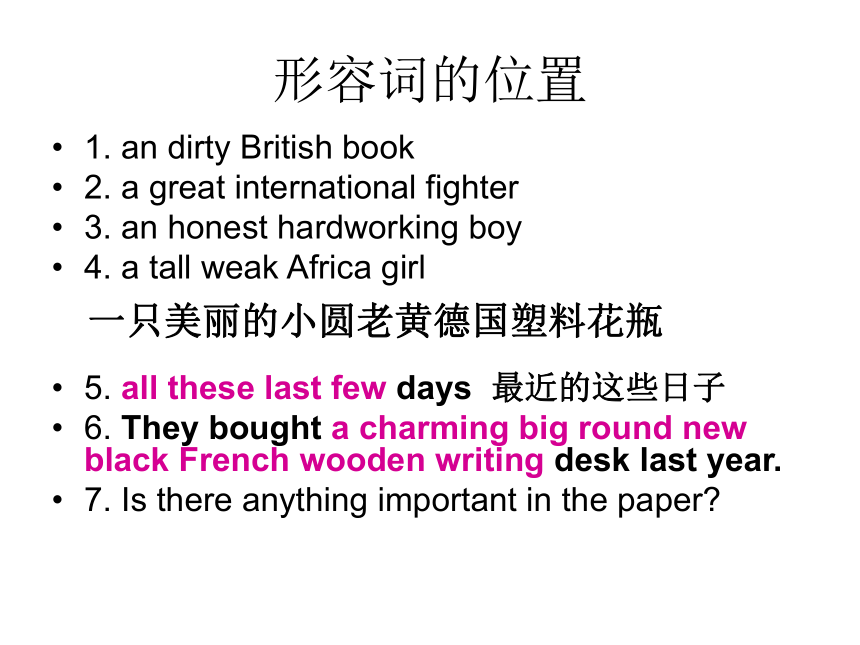
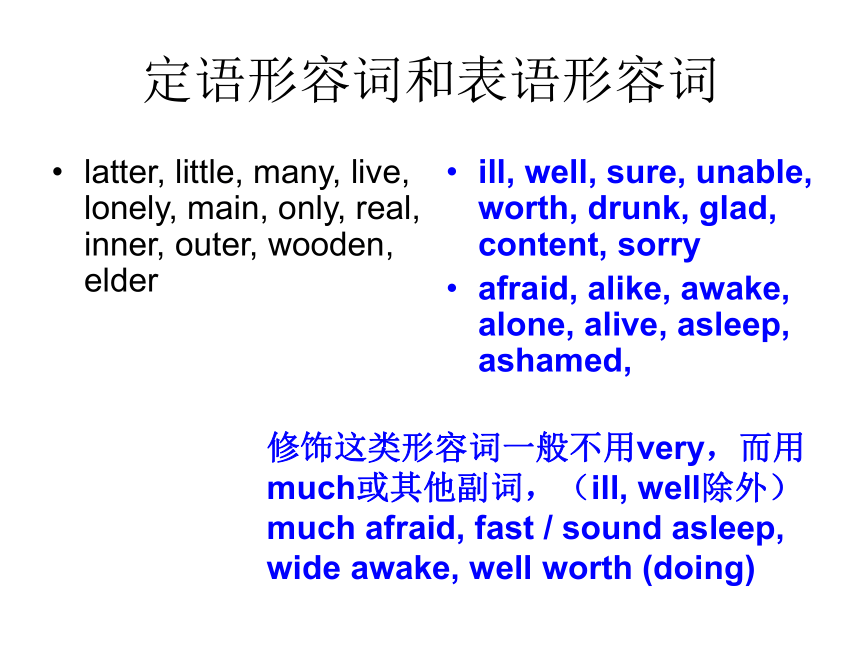
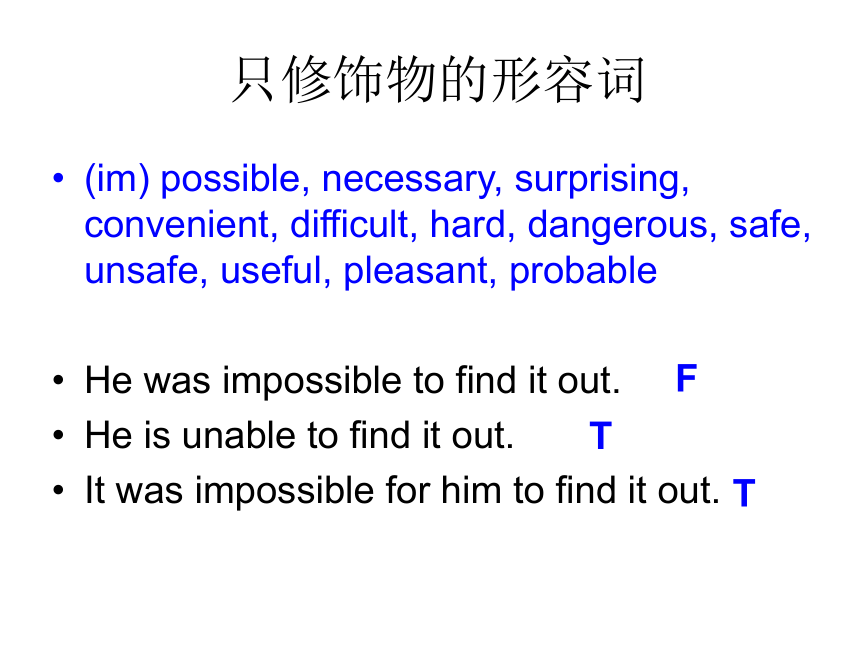
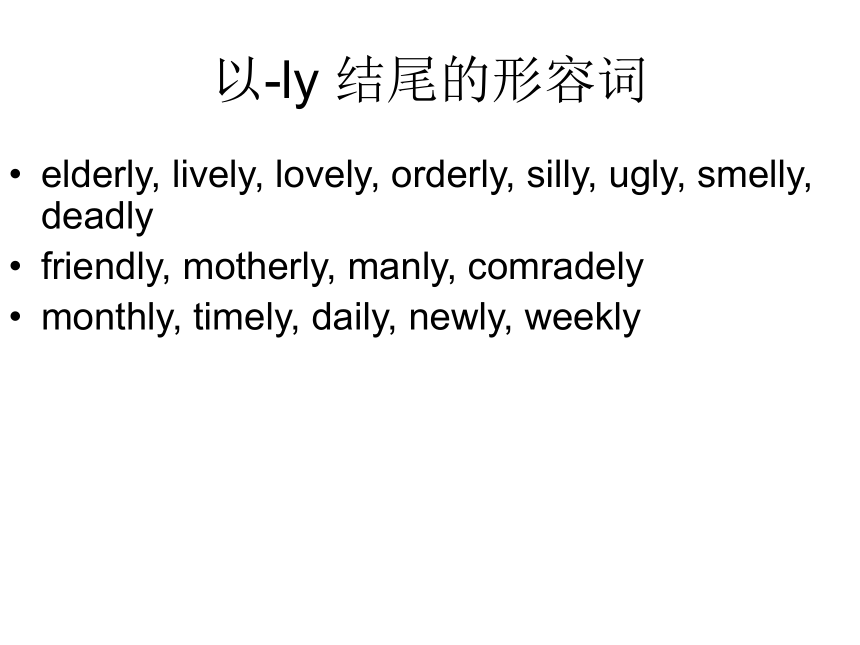
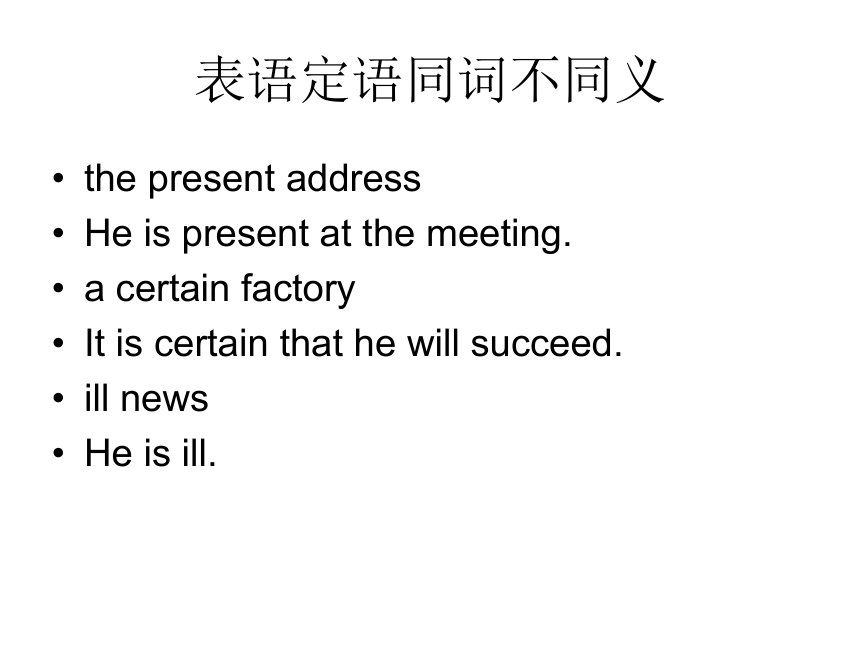
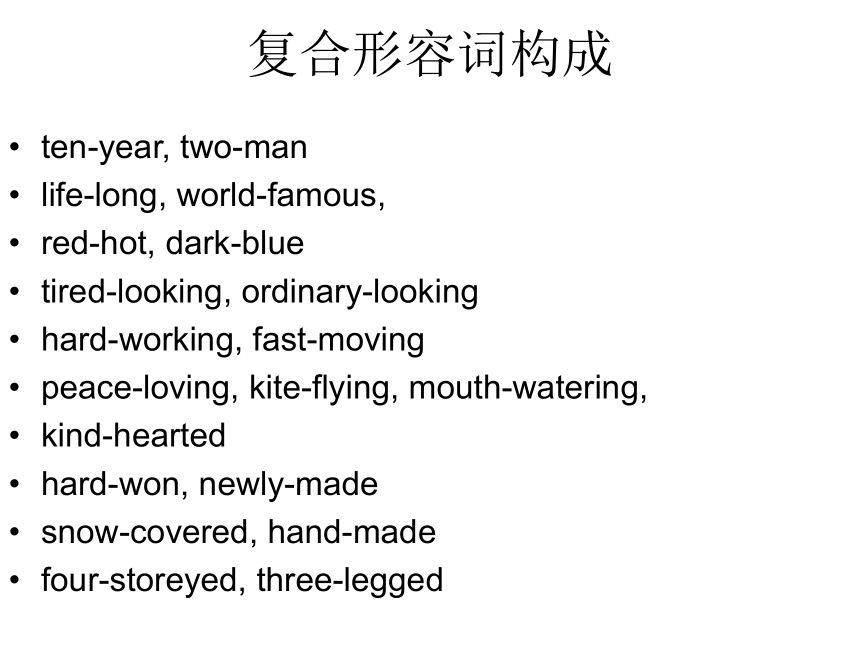
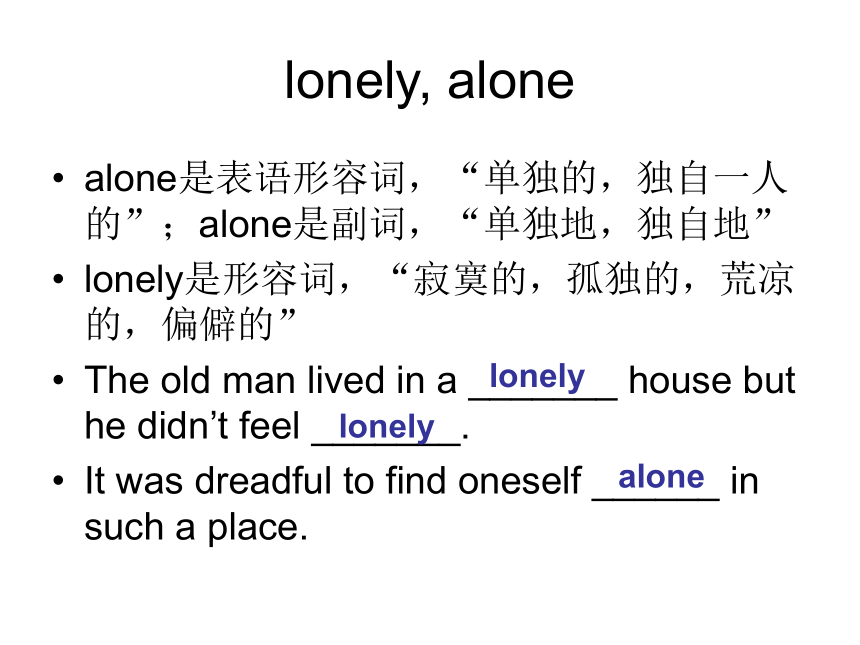
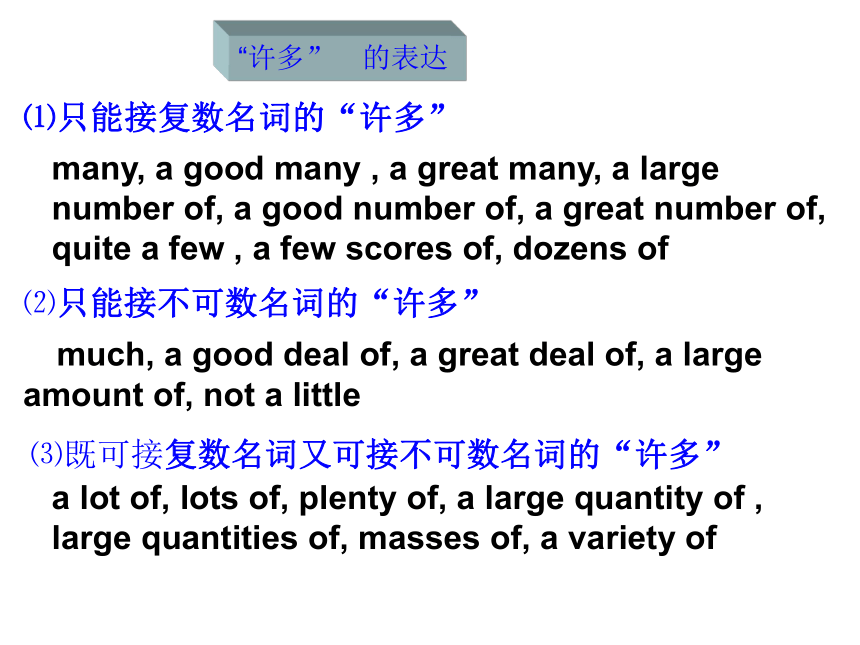
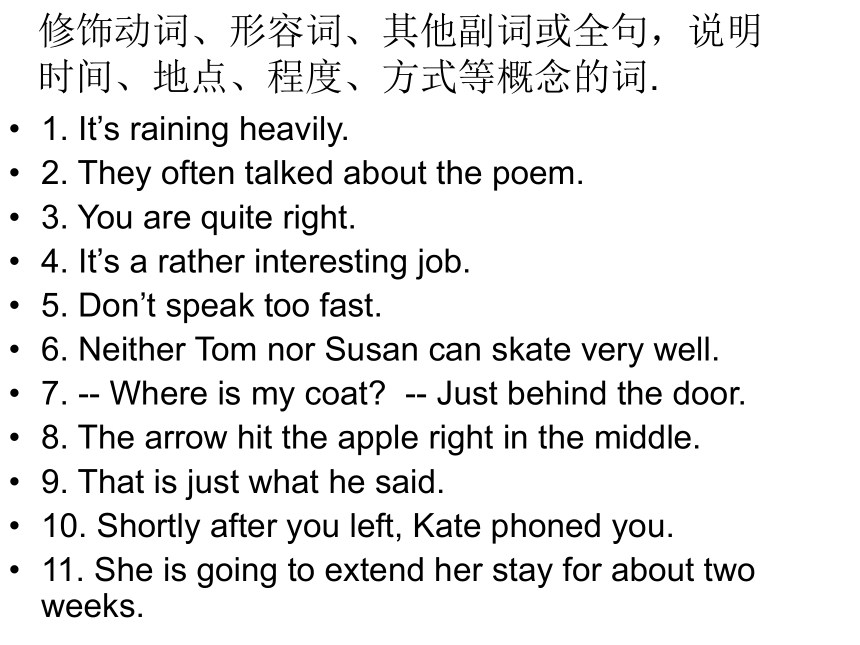
文档简介
课件33张PPT。形容词与副词用来修饰名词或不定代词,表示人或事物的性质、状态和特征的词.1. I have something important to discuss with you.
2. A straightforward talk is better than a flowery speech.
3. His advice is quite helpful.
4. He looks very strong.
5. The wind made the windows open.
6. He found the door open.
7. The man was found dead by the sea.
8. The plan of house was considered very good.
9. Yesterday the sick were sent home.
10. The moon is at the full.
11. The old man was lying in bed, dead.
12. Afraid of the stepmother, the poor girl wandered here and there.become, go, grow, get, turn,
feel, look, sound, smell, taste,
appear, seem, prove, be, keep, remain1. an dirty British book
2. a great international fighter
3. an honest hardworking boy
4. a tall weak Africa girl
5. all these last few days 最近的这些日子
6. They bought a charming big round new black French wooden writing desk last year.
7. Is there anything important in the paper?形容词的位置一只美丽的小圆老黄德国塑料花瓶定语形容词和表语形容词latter, little, many, live, lonely, main, only, real, inner, outer, wooden, elderill, well, sure, unable, worth, drunk, glad, content, sorry
afraid, alike, awake, alone, alive, asleep, ashamed,
修饰这类形容词一般不用very,而用much或其他副词,(ill, well除外)
much afraid, fast / sound asleep, wide awake, well worth (doing) 只修饰物的形容词(im) possible, necessary, surprising, convenient, difficult, hard, dangerous, safe, unsafe, useful, pleasant, probable
He was impossible to find it out.
He is unable to find it out.
It was impossible for him to find it out.TTF以-ly 结尾的形容词elderly, lively, lovely, orderly, silly, ugly, smelly, deadly
friendly, motherly, manly, comradely
monthly, timely, daily, newly, weekly表语定语同词不同义the present address
He is present at the meeting.
a certain factory
It is certain that he will succeed.
ill news
He is ill.复合形容词构成ten-year, two-man
life-long, world-famous,
red-hot, dark-blue
tired-looking, ordinary-looking
hard-working, fast-moving
peace-loving, kite-flying, mouth-watering,
kind-hearted
hard-won, newly-made
snow-covered, hand-made
four-storeyed, three-legged
lonely, alonealone是表语形容词,“单独的,独自一人的”;alone是副词,“单独地,独自地”
lonely是形容词,“寂寞的,孤独的,荒凉的,偏僻的”
The old man lived in a _______ house but he didn’t feel _______.
It was dreadful to find oneself ______ in such a place.lonelylonelyalone“许多” 的表达⑴只能接复数名词的“许多”many, a good many , a great many, a large number of, a good number of, a great number of, quite a few , a few scores of, dozens of⑵只能接不可数名词的“许多” much, a good deal of, a great deal of, a large amount of, not a little⑶既可接复数名词又可接不可数名词的“许多”a lot of, lots of, plenty of, a large quantity of , large quantities of, masses of, a variety of1. It’s raining heavily.
2. They often talked about the poem.
3. You are quite right.
4. It’s a rather interesting job.
5. Don’t speak too fast.
6. Neither Tom nor Susan can skate very well.
7. -- Where is my coat? -- Just behind the door.
8. The arrow hit the apple right in the middle.
9. That is just what he said.
10. Shortly after you left, Kate phoned you.
11. She is going to extend her stay for about two weeks.
修饰动词、形容词、其他副词或全句,说明时间、地点、程度、方式等概念的词.12. His room here is full of roses.
13. Is there any film on tonight?
14. Sister is away.
15. Jack has never been abroad before.
16. I’m so glad I found you in.
17. He slept with the radio on.
18. She clasped the baby in her arms from ahead.
19. He took out the toy from upstairs.
副词的构成1. now here there
2. –ly, slowly carefully happily easily
-ward, / -wards, downward, inwards, upward
-ways, always, sideways
-wise, otherwise, clockwise, anticlockwise
3. early late high close副词的种类1. now, usually, often, always
2. here, there, out, everywhere
3. hard, well, fast, slowly
4. very, much, still, almost, nearly
5. wh-词
) Where do you come from?
) Put it where you pick it up.
) This is the house where he was born.
) Do you know what it is?
副词的位置1. It’s very hot.
My aunt looks quite young.
You are old enough to go to school.
2. The peasants here are busy planting the trees.
There is the house, right in front of you.
Truly he will go to Shanghai.3.1 He always gets up late.
I usually go out by bike.
I shall never forget you.
Betty is seldom late for school.
You have never told lies to me.
3.2 I saw him yesterday.
Yesterday I saw him.
3.3 Mr. Li was born here.
We are going to Shanghai tomorrow.
3.4 He closed the door quietly.
He quietly closed the door.
Quietly he closed the door.
同根副词辨析hard
most
loud
free
late
near
just
close
high
wide
deep
hardly
mostly
loudly
freely
lately
nearly
justly
closely
highly
widely
deeply
努力地
极,非常
大声地
免费地
晚,迟
邻近
刚才,仅仅
接近地
高
广阔地,充分地
深,迟
几乎不
主要地
大声地(含有喧闹的意思)
自由地,无拘束地
近来
几乎
公正地,正当地
仔细地,密切地
高度地,非常地
广泛地
抽象意义“深深地”
形容词,副词的比较级,最高级fat, thin, big, fit, big, hot表示“最高程度”的形容词(extreme, perfect, favourite, excellent)没有最高级也不用比较级1. She is the ______ of the three (sisters).
(She is the ______ sister.)
2. My ______ brother is two years ______ than me.
3. I am his ______ daughter (son).
4. No ______ discussion is necessary.
5. Don’t make any changes till _______ notice.eldesteldestelderoldereldestfurtherfurther形容词、副词的级同级比较 as (so) +原级+as
the same as
such as
not + as (so) +原级+as
比较级比较 比较级+than
more / less +原级+ than
最高级比较 (the) + 最高级 Henry is as good a worker as Peter (is ).=Henry is such a good worker as Peter (is ).(注意冠词的位置)
His name is the same as his father’s (name).倍数表达…+ 谓语 + 倍数/分数+as +原级+as+…
某事物是某事物的…倍数
…+ 谓语 + 倍数/分数+比较级+than+…
某事物比某事物多出的…倍数
…+ 谓语 + 倍数/分数+the +size (amount, length, width, depth, height, weight …)+of +…
某事物是某事物的…倍数time(s) 表示倍数,一般只限于表示包括基数在内三倍或三倍以上的数。表示两倍可以用twice, double1.用介词 by 表示相差的程度.She is taller than I by three inches.I missed the last train by one minute.2.一个人的两种性质的比较, 用 more…than结构:---Ann acts quite unfriendly.
---I think she’s more shy than unfriendly.(与其说她不友好, 不如说她害羞.)3. 比较的对象应该相同.The weather here is warmer than that of Shanghai.The radios made in our factory are better than those (made) in your factory.The population of China is larger than that of any other country in the world.China has a larger population than any other country.(人口与人口相比)(国家与国家相比较)4.比较的对象不能相互包容,注意:比较级+than +any other + 单数名词anyone else all (the) other +复数名词
any of the other + 复数名词any other student in his class.any girl in his class.all other students in his class.anyone else in his class.He is taller thanChina is larger than any other country in Asia. any country in Africa.eg:5. the +比较级+of +两个人或事物表示“两者之间更…”
1. The book is the thicker of the two.
2. Tom is the older of the two boys.
3. Mary was the younger of the two girls.
4. The summer palace is the more beautiful of the two parks.
5. Which is the larger country, Canada or Australia?
6.名不符实的比较等级结构特殊词as soon as 一…就… no sooner …than 刚…就…
in the least 丝毫 least of all 尤其
as well as 以及 might…as well 还是…得好
so/as far as 就...说来
as much as 甚至; 相当于
more than 非常,不仅仅 , other than 不同于,除了
no more than 仅仅,只有
as good as 几乎已经;实际等于
less than 毫不
much less 更不用说 as…as possible 尽可能的
as early as 早在 as/so long as只要,如果,既然They were more than willing to help.The house was as good as sold.7. 最高级的多种表达法⑴ 否定词+比较级It can’t be worse.⑵ more… than the other… ;
more …than any other…
more …than any …elseHe is more fit for his office than anybody else.⑶ No…more…thanNo advice is better than this.⑷ No…as…as…No doctor is as excellent as Tom’s father.⑸ the least…This watch is the least expensive of all.⑹ less than…All the other cities are less beautiful than this one.8.形容词最高级前不用 the 的场合⑴ 形容词最高级用于同自身不同场合相比较时不带 theI’m busiest on Sundays.⑵形容词最高级前有物主代词﹑名词所有格时不带 theJane is the old man’s eldest girl.⑶两个或多个形容词最高级并列使用,从第二个起就不带 the
Tom is the youngest and tallest boy in our class.⑷形容词最高级在句中作宾语补足语时常不带 theWe find listening hardest in our English study.⑸most前没有the 或有a 时等于 veryThis is a most difficult problem to solve.⑹某些习惯表达法中的形容词最高级常不带 the
With best wishes!9.程度状语修饰原级:fairly, quite, rather, so, very, too等
修饰比较级用much, even, far, rather, no, any, a lot, a little, a bit, still, yet, a great deal, by far
修饰最高级用序数词, much, by far, nearly, almost, by no means, not quite, not really,
by far通常用于最高级。若用于比较级,如放在前面,应在中间加“the”
John is by far the cleverest boy in the school.
He is taller by far than his brother.
He is by far the taller of the two brothers.10.形容词、副词的后置形容词修饰不定代词时须后置
表语形容词作定语时须后置
enough修饰形容词、副词时后置
形容词old, long, high, wide, deep与表示度量的词组连用时须后置
由and或or连接两个或多个同类属的形容词修饰一个名词时后置
形容词短语作定语相当于定语从句须后置
分词短语作定语须后置
介词短语作定语须后置
else常置于不定代词或疑问代词之后作定语.
There is nothing serious.
He is one of the men alive surviving the war.
We were fortunate enough to get an empty car.
The rope is 200 miles long.
Every country, big or small, has its strong points and weak points.
Jack is the person suitable for the job.
He was reading a novel written by Charles Dickens.
A professor from Tsinghua University will give us a lecture about pollution.
Anything else can I do for you, sir?有些形容词如:present(现在的;出席在场的), involved, (复杂的;有牵涉的)responsible(可靠的;须承担责任;) 等用作名词词组修饰语,虽也既能前置又能后置,但前置与后置的含义完全不同.如:
the members present 出席的成员the present members 现在的成员
2. A straightforward talk is better than a flowery speech.
3. His advice is quite helpful.
4. He looks very strong.
5. The wind made the windows open.
6. He found the door open.
7. The man was found dead by the sea.
8. The plan of house was considered very good.
9. Yesterday the sick were sent home.
10. The moon is at the full.
11. The old man was lying in bed, dead.
12. Afraid of the stepmother, the poor girl wandered here and there.become, go, grow, get, turn,
feel, look, sound, smell, taste,
appear, seem, prove, be, keep, remain1. an dirty British book
2. a great international fighter
3. an honest hardworking boy
4. a tall weak Africa girl
5. all these last few days 最近的这些日子
6. They bought a charming big round new black French wooden writing desk last year.
7. Is there anything important in the paper?形容词的位置一只美丽的小圆老黄德国塑料花瓶定语形容词和表语形容词latter, little, many, live, lonely, main, only, real, inner, outer, wooden, elderill, well, sure, unable, worth, drunk, glad, content, sorry
afraid, alike, awake, alone, alive, asleep, ashamed,
修饰这类形容词一般不用very,而用much或其他副词,(ill, well除外)
much afraid, fast / sound asleep, wide awake, well worth (doing) 只修饰物的形容词(im) possible, necessary, surprising, convenient, difficult, hard, dangerous, safe, unsafe, useful, pleasant, probable
He was impossible to find it out.
He is unable to find it out.
It was impossible for him to find it out.TTF以-ly 结尾的形容词elderly, lively, lovely, orderly, silly, ugly, smelly, deadly
friendly, motherly, manly, comradely
monthly, timely, daily, newly, weekly表语定语同词不同义the present address
He is present at the meeting.
a certain factory
It is certain that he will succeed.
ill news
He is ill.复合形容词构成ten-year, two-man
life-long, world-famous,
red-hot, dark-blue
tired-looking, ordinary-looking
hard-working, fast-moving
peace-loving, kite-flying, mouth-watering,
kind-hearted
hard-won, newly-made
snow-covered, hand-made
four-storeyed, three-legged
lonely, alonealone是表语形容词,“单独的,独自一人的”;alone是副词,“单独地,独自地”
lonely是形容词,“寂寞的,孤独的,荒凉的,偏僻的”
The old man lived in a _______ house but he didn’t feel _______.
It was dreadful to find oneself ______ in such a place.lonelylonelyalone“许多” 的表达⑴只能接复数名词的“许多”many, a good many , a great many, a large number of, a good number of, a great number of, quite a few , a few scores of, dozens of⑵只能接不可数名词的“许多” much, a good deal of, a great deal of, a large amount of, not a little⑶既可接复数名词又可接不可数名词的“许多”a lot of, lots of, plenty of, a large quantity of , large quantities of, masses of, a variety of1. It’s raining heavily.
2. They often talked about the poem.
3. You are quite right.
4. It’s a rather interesting job.
5. Don’t speak too fast.
6. Neither Tom nor Susan can skate very well.
7. -- Where is my coat? -- Just behind the door.
8. The arrow hit the apple right in the middle.
9. That is just what he said.
10. Shortly after you left, Kate phoned you.
11. She is going to extend her stay for about two weeks.
修饰动词、形容词、其他副词或全句,说明时间、地点、程度、方式等概念的词.12. His room here is full of roses.
13. Is there any film on tonight?
14. Sister is away.
15. Jack has never been abroad before.
16. I’m so glad I found you in.
17. He slept with the radio on.
18. She clasped the baby in her arms from ahead.
19. He took out the toy from upstairs.
副词的构成1. now here there
2. –ly, slowly carefully happily easily
-ward, / -wards, downward, inwards, upward
-ways, always, sideways
-wise, otherwise, clockwise, anticlockwise
3. early late high close副词的种类1. now, usually, often, always
2. here, there, out, everywhere
3. hard, well, fast, slowly
4. very, much, still, almost, nearly
5. wh-词
) Where do you come from?
) Put it where you pick it up.
) This is the house where he was born.
) Do you know what it is?
副词的位置1. It’s very hot.
My aunt looks quite young.
You are old enough to go to school.
2. The peasants here are busy planting the trees.
There is the house, right in front of you.
Truly he will go to Shanghai.3.1 He always gets up late.
I usually go out by bike.
I shall never forget you.
Betty is seldom late for school.
You have never told lies to me.
3.2 I saw him yesterday.
Yesterday I saw him.
3.3 Mr. Li was born here.
We are going to Shanghai tomorrow.
3.4 He closed the door quietly.
He quietly closed the door.
Quietly he closed the door.
同根副词辨析hard
most
loud
free
late
near
just
close
high
wide
deep
hardly
mostly
loudly
freely
lately
nearly
justly
closely
highly
widely
deeply
努力地
极,非常
大声地
免费地
晚,迟
邻近
刚才,仅仅
接近地
高
广阔地,充分地
深,迟
几乎不
主要地
大声地(含有喧闹的意思)
自由地,无拘束地
近来
几乎
公正地,正当地
仔细地,密切地
高度地,非常地
广泛地
抽象意义“深深地”
形容词,副词的比较级,最高级fat, thin, big, fit, big, hot表示“最高程度”的形容词(extreme, perfect, favourite, excellent)没有最高级也不用比较级1. She is the ______ of the three (sisters).
(She is the ______ sister.)
2. My ______ brother is two years ______ than me.
3. I am his ______ daughter (son).
4. No ______ discussion is necessary.
5. Don’t make any changes till _______ notice.eldesteldestelderoldereldestfurtherfurther形容词、副词的级同级比较 as (so) +原级+as
the same as
such as
not + as (so) +原级+as
比较级比较 比较级+than
more / less +原级+ than
最高级比较 (the) + 最高级 Henry is as good a worker as Peter (is ).=Henry is such a good worker as Peter (is ).(注意冠词的位置)
His name is the same as his father’s (name).倍数表达…+ 谓语 + 倍数/分数+as +原级+as+…
某事物是某事物的…倍数
…+ 谓语 + 倍数/分数+比较级+than+…
某事物比某事物多出的…倍数
…+ 谓语 + 倍数/分数+the +size (amount, length, width, depth, height, weight …)+of +…
某事物是某事物的…倍数time(s) 表示倍数,一般只限于表示包括基数在内三倍或三倍以上的数。表示两倍可以用twice, double1.用介词 by 表示相差的程度.She is taller than I by three inches.I missed the last train by one minute.2.一个人的两种性质的比较, 用 more…than结构:---Ann acts quite unfriendly.
---I think she’s more shy than unfriendly.(与其说她不友好, 不如说她害羞.)3. 比较的对象应该相同.The weather here is warmer than that of Shanghai.The radios made in our factory are better than those (made) in your factory.The population of China is larger than that of any other country in the world.China has a larger population than any other country.(人口与人口相比)(国家与国家相比较)4.比较的对象不能相互包容,注意:比较级+than +any other + 单数名词anyone else all (the) other +复数名词
any of the other + 复数名词any other student in his class.any girl in his class.all other students in his class.anyone else in his class.He is taller thanChina is larger than any other country in Asia. any country in Africa.eg:5. the +比较级+of +两个人或事物表示“两者之间更…”
1. The book is the thicker of the two.
2. Tom is the older of the two boys.
3. Mary was the younger of the two girls.
4. The summer palace is the more beautiful of the two parks.
5. Which is the larger country, Canada or Australia?
6.名不符实的比较等级结构特殊词as soon as 一…就… no sooner …than 刚…就…
in the least 丝毫 least of all 尤其
as well as 以及 might…as well 还是…得好
so/as far as 就...说来
as much as 甚至; 相当于
more than 非常,不仅仅 , other than 不同于,除了
no more than 仅仅,只有
as good as 几乎已经;实际等于
less than 毫不
much less 更不用说 as…as possible 尽可能的
as early as 早在 as/so long as只要,如果,既然They were more than willing to help.The house was as good as sold.7. 最高级的多种表达法⑴ 否定词+比较级It can’t be worse.⑵ more… than the other… ;
more …than any other…
more …than any …elseHe is more fit for his office than anybody else.⑶ No…more…thanNo advice is better than this.⑷ No…as…as…No doctor is as excellent as Tom’s father.⑸ the least…This watch is the least expensive of all.⑹ less than…All the other cities are less beautiful than this one.8.形容词最高级前不用 the 的场合⑴ 形容词最高级用于同自身不同场合相比较时不带 theI’m busiest on Sundays.⑵形容词最高级前有物主代词﹑名词所有格时不带 theJane is the old man’s eldest girl.⑶两个或多个形容词最高级并列使用,从第二个起就不带 the
Tom is the youngest and tallest boy in our class.⑷形容词最高级在句中作宾语补足语时常不带 theWe find listening hardest in our English study.⑸most前没有the 或有a 时等于 veryThis is a most difficult problem to solve.⑹某些习惯表达法中的形容词最高级常不带 the
With best wishes!9.程度状语修饰原级:fairly, quite, rather, so, very, too等
修饰比较级用much, even, far, rather, no, any, a lot, a little, a bit, still, yet, a great deal, by far
修饰最高级用序数词, much, by far, nearly, almost, by no means, not quite, not really,
by far通常用于最高级。若用于比较级,如放在前面,应在中间加“the”
John is by far the cleverest boy in the school.
He is taller by far than his brother.
He is by far the taller of the two brothers.10.形容词、副词的后置形容词修饰不定代词时须后置
表语形容词作定语时须后置
enough修饰形容词、副词时后置
形容词old, long, high, wide, deep与表示度量的词组连用时须后置
由and或or连接两个或多个同类属的形容词修饰一个名词时后置
形容词短语作定语相当于定语从句须后置
分词短语作定语须后置
介词短语作定语须后置
else常置于不定代词或疑问代词之后作定语.
There is nothing serious.
He is one of the men alive surviving the war.
We were fortunate enough to get an empty car.
The rope is 200 miles long.
Every country, big or small, has its strong points and weak points.
Jack is the person suitable for the job.
He was reading a novel written by Charles Dickens.
A professor from Tsinghua University will give us a lecture about pollution.
Anything else can I do for you, sir?有些形容词如:present(现在的;出席在场的), involved, (复杂的;有牵涉的)responsible(可靠的;须承担责任;) 等用作名词词组修饰语,虽也既能前置又能后置,但前置与后置的含义完全不同.如:
the members present 出席的成员the present members 现在的成员
